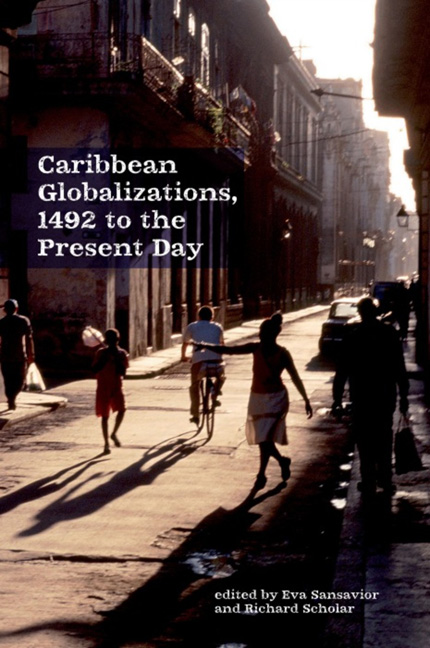Book contents
- Frontmatter
- Contents
- Contributors
- Prologue: Globalization, Globality, Globe-Stone
- Introduction
- I Globalizations in the Making
- 1 The Archipelago Goes Global: Late Glissant and the Early Modern Isolario
- 2 How Globalization Invented Indians in the Caribbean
- 3 Precocious Modernity: Environmental Change in the Early Caribbean
- 4 ‘Slaves’ in My Family: French Modes of Servitude in the New World
- 5 Paradoxical Encounters: The Essay as a Space of Globalization in Montaigne's ‘Des Cannibales’ and Maryse Condé's ‘O Brave New World’
- II The Complex Present
- Acknowledgements
- Index
5 - Paradoxical Encounters: The Essay as a Space of Globalization in Montaigne's ‘Des Cannibales’ and Maryse Condé's ‘O Brave New World’
from I - Globalizations in the Making
- Frontmatter
- Contents
- Contributors
- Prologue: Globalization, Globality, Globe-Stone
- Introduction
- I Globalizations in the Making
- 1 The Archipelago Goes Global: Late Glissant and the Early Modern Isolario
- 2 How Globalization Invented Indians in the Caribbean
- 3 Precocious Modernity: Environmental Change in the Early Caribbean
- 4 ‘Slaves’ in My Family: French Modes of Servitude in the New World
- 5 Paradoxical Encounters: The Essay as a Space of Globalization in Montaigne's ‘Des Cannibales’ and Maryse Condé's ‘O Brave New World’
- II The Complex Present
- Acknowledgements
- Index
Summary
In loving memory of my father.
Spanning the early modern and the modern periods, this essay concerns itself with the shared manifestations of the genre of the essay as ‘spaces’ of ‘paradoxical encounters’ that are inextricable from the process of globalization. Through a comparative close reading of Michel de Montaigne's ‘Des Cannibales’ and Maryse Condé's ‘O Brave New World’, I foreground the inherent—albeit paradoxical—spatiality of the encounters that are realized within the essay. Such a concern is an apposite starting point from which to explore the two notions of paradox that shape such encounters: on the one hand, an early modern conception as an idea or a form of reasoning that is contrary to popular opinion and, on the other, a contemporary view of paradox as a form of reasoning that contains internally contradictory propositions. In key respects, it is a doubled view of paradox that provides the generative impulse for the comparative focus of this essay which, in contrast to standard practice, draws together two works which may at first appear to belong to divergent traditions and historical epochs. It is this apparent divergence which in turn explains my use of a practice of close reading in this essay, a practice which in its attentiveness to the transhistorical and transcultural echoes across and within both essays seeks to offer a ‘readerly’ critical response to works which, as I argue here, have in common their wide-ranging commitment to reading as both creative and critical practice. In keeping with this, the practice of close reading that I employ here is concerned not so much with offering answers as with mapping the complex arc of questions posed by this seemingly divergent pairing of essays. Both the title and content of ‘O Brave New World’ provide unproblematic justification for readings that bring to light the structuring role of globalization in this specific essay and in Condé's broader body of work. In contrast, reading Montaigne's essay in terms of its imbrication in what is commonly considered to be a phenomenon that began in the twentieth century appears, at least at first sight, to be an anachronistic critical gesture. Furthermore, this critical gesture poses the question of the temporality of globalization itself, and specifically the question of to what time does globalization ‘belong’.
- Type
- Chapter
- Information
- Caribbean Globalizations, 1492 to the Present Day , pp. 127 - 152Publisher: Liverpool University PressPrint publication year: 2015



